- Home
- Glynnis Campbell
MacAdam's Lass
MacAdam's Lass Read online
MacADAM’S LASS
The Scottish Lasses, Book 2
by
MacADAM’S LASS
Copyright © 2011, 2014 by Glynnis Campbell
Previously published as “Seduced by Destiny” by Kira Morgan
by Hachette Book Group, Inc.
Excerpt from MacKENZIE’S LASS
Copyright © 2016 by Glynnis Campbell
Glynnis Campbell – Publisher
P.O. Box 341144
Arleta, California 91331
ISBN-13: 978-1-938114-20-5
Contact: [email protected]
Cover design by Tanya Straley
Formatting by Author E.M.S.
All rights reserved. No part of this book may be reproduced in any form or by any electronic or mechanical means, including information storage and retrieval systems, without permission in writing from the author, except by a reviewer who may quote brief passages in a review.
PUBLISHER’S NOTE: This work is a work of fiction. Names, places, characters and incidents are the product of the author’s imagination or are used fictitiously. Any resemblance to actual events, locales or persons, living or dead, is coincidental.
Learn more about Glynnis Campbell and her writing at www.glynnis.net
Table of Contents
Copyright
Dedication and Acknowledgments
MacADAM’S LASS
Prologue
Chapter 1
Chapter 2
Chapter 3
Chapter 4
Chapter 5
Chapter 6
Chapter 7
Chapter 8
Chapter 9
Chapter 10
Chapter 11
Chapter 12
Chapter 13
Chapter 14
Chapter 15
Chapter 16
Chapter 17
Chapter 18
Chapter 19
Chapter 20
Chapter 21
Chapter 22
Chapter 23
Chapter 24
Chapter 25
Chapter 26
Chapter 27
Chapter 28
Chapter 29
Chapter 30
Chapter 31
Chapter 32
Chapter 33
Chapter 34
Chapter 35
Chapter 36
Chapter 37
Chapter 38
Chapter 39
Chapter 40
Chapter 41
Chapter 42
Chapter 43
Chapter 44
Chapter 45
Chapter 46
Chapter 47
Chapter 48
Chapter 49
Epilogue
Dear Reader
More Books by Glynnis Campbell
About Glynnis Campbell
Contact Information
From the Jewels
Sneak Peek at MacKENZIE’S LASS
Dedication
For all the Kathy’s
who’ve made a difference in romance:
Kathleen Woodiwiss, Mother of Historicals
Kathryn Falk, Queen of Readers
Kate Duffy, Fearless Editor
Kathy Baker, Bookseller Extraordinaire
Kathe Robin, Gifted Reviewer
Kathleen Givens, Irreverent Angel
Acknowledgments
Special thanks to…
Lauren Royal and Karen Nesbitt
for sharing the adventure in Scotland
Richard Campbell
for taking a third wife
Robin McGregor
Secretary of Musselburgh Links
for his generosity, patience, and vivid tales
David Hamilton
author of Golf—Scotland’s Game
for his depth of expertise and his enthusiasm
James McAvoy and Reese Witherspoon
for their inspiration
Fair Maiden Lilliard
Lies under this stane
Little was her stature
But muckle was her fame
Upon the English loons
She laid monie thumps
An’ when her legs were cuttid off
She fought upon her stumps
Inscription on gravestone near Ancrum Moor,
in the Borders, Scotland
Prologue
FEBRUARY 27, 1545
ANCRUM MOOR, SCOTLAND
The three battle-weary Scots slogged across Ancrum Moor. In spite of the devastation surrounding them, their spirits were at ease, for most of the blood spilled upon the sod was that of their English foes.
Earlier, when they’d beheld the scores of enemy troops marching toward them across the moor, the three comrades-in-arms had exchanged grim farewells, sure ’twas their last day alive.
But to their amazement, the traitorous Border Scots who’d chosen to ally themselves with the English had finally come to their senses. In the middle of the fighting, they’d heeded the plaintive call of the pipes and turned coat on their English captains, assuring a Scots victory.
Now there was nothing to do but bury the dead, return home, and brace for the next skirmish. The English never tired of war, it seemed, and the Borders bore the scars and scorched earth to prove it.
The three men crossed the trampled grass, solemnly picking their way through the fallen, giving more than one mortally wounded English wretch a final stab of mercy with a misericordia.
Then Will paused over one of the dead bodies and frowned, poking it with the tip of his sword. He crouched down to take a closer look.
“Sweet Mary, Mother o’…” he breathed.
“What is it?” Angus grunted.
Will rolled the body over, and all three took a shocked step backward. They recognized the bonnie Scots lass from their village of Selkirk. Her name was Lilliard. But her once soft honey curls were caked with blood, and her rosy lips were ashen. One fist still clutched her sword with a death-grip, but she’d been unable to block the last fatal blow—a blade thrust beneath her ribs that had stopped her heart.
“English devils!” spat Angus. “She was only a wee maid.”
Will shook his head. “Poor lass didn’t have a chance against them.”
“Wait.” Alasdair narrowed his keen eyes. “Who’d allow a lass on the battleground?”
The question gave them all pause. No Scotsman worth his dirk would allow a helpless woman near a field of war.
Will rubbed his grizzled jaw. “Wasn’t her husband killed by the English?”
“Aye, I think so,” Angus said, “two years back, at Solway Moss.”
Alasdair nodded at the bloody linen shirt and gray jerkin draping her poor lifeless body. “Those are his clothes.”
“And his blade, no doubt,” Angus added. “She was likely lookin’ to avenge his murder.”
“But the poor lass had no idea o’ the danger,” said Will.
They stared in thoughtful silence for a while. Then Alasdair cleared his throat. “We should carry her home.”
When they lifted her small body to place her on a plaid, they discovered her arm was broken and both of her legs had been gashed to the bone. The lass hadn’t gone down without a fight.
With their tragic burden, they traversed Ancrum Moor and continued several miles to Selkirk, to the isolated stone house where the lass had lived.
As far as they recalled, Lilliard had no family in the village. The men didn’t even know her surname. Still, Alasdair could read, and there might be some missive in the woman’s house that would help them locate her kin. If nothing else, they could at least give a proper burial to the brave lass.
The cottage appeared empty. No one answered their knocks. When they pushed the door
open, no fire burned on the hearth.
’Twasn’t until they lowered the maid’s broken body gently to the floor that they spied a wee lass in the corner of the room, a flaxen-haired beauty with wide green eyes and her thumb in her mouth.
They froze, speechless, as the tot studied them with stern appraisal, one by one. After a moment, she popped her thumb out of her mouth and toddled forward a step, then stuttered back, plopping onto her bottom with a startled blink.
The men winced, expecting a piercing wail. Instead the lass opened her mouth and uttered one loud, distinct, emphatic word.
“Da!”
Edward Armstrong was halfway home before the wrenching sobs stopped racking his body. He’d fled through the forest, tears streaming down his cheeks, unable to face his fellow soldiers. He didn’t know whether they’d won or lost the battle at Ancrum Moor, and he didn’t care. He wasn’t fit to defend the English crown. Holy Mother! After what he’d done, he wasn’t fit to muck out King Henry’s stables.
He leaned against an oak trunk, fighting a dizzying wave of nausea. Every time he closed his eyes, he saw her face—her fair cheeks, her innocent eyes, her pleading lips—just before…
He stumbled to his knees and retched into the bushes, but nothing could purge him of the hideous memory.
He hadn’t meant to hurt the lass. He hadn’t meant to hurt anyone. Violence was against his nature. But his brothers had expected him to fight alongside them, and he’d joined the battle at their prodding.
They’d never told him he’d be killing women.
He shivered, then rose on shaky legs, wiping his damp brow with the back of one trembling hand.
He had to get home. Everything would be fine if he could just get back home.
God’s wounds! What had the lovely maid been doing there? Her angelic face didn’t belong in the midst of such a massacre.
When he’d first glimpsed the Scottish lass wielding a blade, Edward’s instinct had been to retreat. He’d had little enough desire to engage Scottish soldiers, none at all to battle a Scottish maid.
But then she’d turned a dewy, stunned gaze up to him, and her lips had moved in silent prayer. As he lowered his eyes, he saw that her left arm hung limp at her side, and blood had begun to soak the bottom of her oversized shirt like a rapidly blossoming scarlet rose.
She was too weak to lift her sword, and ’twas a miracle she was still standing, for he could see both thighs had been deeply slashed by a blade. She was going to die—she was losing too much blood to survive.
Death would come slowly and painfully, and she seemed to know it. What she begged of him with her glance was mercy.
Without hesitation, he did what he thought was right. While the battle raged ruthlessly around them, he granted her the mercy she requested.
Only after he pulled the blade out of her frail chest and watched her sink lifelessly to the ground did he realize what he’d done. God forgive him, he’d slain a woman.
He pressed his palms hard against his eyes, then ran a shaking hand back through his hair. He had to get home. He had to go somewhere familiar, where he could remember the gentle soul he’d been and not the monster he’d become.
’Twas nightfall when Edward at last staggered through the door of his cottage, a safe three miles across the border.
His six-year-old son Andrew knew at once that something was wrong. The lad was perceptive and bright, as curious and interested in life as Edward had been in his youth…before his brothers had pressured him into taking up the sword.
Andrew would grow to be a better man than he was. The lad was blessed not only with his departed mother’s piercing blue eyes and rich brown hair, but also her brilliant mind, her even temper, her strength of character. Andrew would succeed where his father had failed.
Edward knew what he had to do. He stirred the fire to a cheery blaze and lit all the candles in the room, chasing away the dark shades that haunted him. Then he asked the lad to pour him ale while he fetched a scrap of parchment, ink, and a quill from the cupboard.
The ale did its work. His hands stopped trembling, his stomach settled, and his mind cleared. He dragged a candle close and, with a steady hand, scrawled out all of it in plain terms—his sin, his shame, his atonement.
When he was finished, a strange peace settled over him. He rolled up the parchment and gave it to Andrew, kissing his son’s head and bidding him take the missive to his uncles’ house.
Andrew may not have understood what was wrong, but he sensed his father’s urgency. He ran the whole mile in the moonlight, breathlessly giving the note to his Uncle Thomas, who read it aloud to Robert and Simon. The more Thomas read, the more upset they all became.
His uncle finished the missive, then flung open the door, and the three of them raced with Andrew all the way back to his father’s house, dragging him along until his sides ached.
They burst in through the door, making the candles in the room flicker wildly. Uncle Thomas gasped and tried to block Andrew’s view, but ’twas too late. Andrew saw his father swaying from the rafters, just like the outlaws that were sometimes hanged from the town gallows.
While Andrew regarded them in stunned silence, his uncles swore and sobbed. They cut his father’s body down, cursing the Scots with words Andrew had never heard before, saying the Scots were to blame for his father’s death. He wasn’t sure, but it sounded like his uncles were angry at the Scots for giving swords to lasses.
They buried his father in the yard by the light of the moon and spoke a few words over his grave. Then they looked down at Andrew, and Uncle Simon placed his hand on Andrew’s shoulder.
He said that today the uncles were going to make Andrew’s father a solemn promise. They’d take care of Andrew from now on. They’d feed him, clothe him, shelter him, and, most importantly, train him. The Scots would regret slaying his father, they said, for they intended to turn Andrew into an unrivaled swordsman and a fierce killer—a man of whom his father would have been proud.
Chapter 1
AUGUST 19, 1561
MUSSELBURGH, SCOTLAND
Andrew…Drew…scowled as he eyed his opponent across the field. He’d trained long and hard for this duel. He didn’t intend to lose, especially not to the cocksure Scots nobleman who was currently brandishing his weapon with all the grace of a crofter chopping wheat.
Drew seldom lost. He’d earned his reputation on the tournament field as a master. He was lithe, strong, and intimidating. His arm was powerful and his aim deadly. He’d left his last two opponents gasping on their knees and the one before that cursing into the dust.
Ian Horn would likewise prove an easy conquest. The barrel-chested Scot was currently making a great show of flexing his arms, adjusting his trews, and gauging the position of the rising sun, which was nearly invisible on this unusually gloomy summer morn. But it seemed to Drew that Horn was merely delaying his inevitable demise.
The motley mob of peasants and merchants and nobles who crowded around them, shouting and shoving and placing hasty wagers on the match, did not agree. By the loud cheers they sent Horn’s way and the nasty aspersions they hurled at Drew, ’twas apparent most of them had bet heavily on their local hero.
Unable to stall any further, Horn mopped his brow, cleared his throat, and approached, gripping his weapon so tightly that it seemed as if he meant to throttle the life out of it.
The crowd hushed, their gazes locked on the combatants.
Drew took a calm breath and waited.
Despite the man’s poor form as he swung, there was a tap as he managed to connect with the ball, sending it bounding well down the green, where it arced to the left, bounced four times, but somehow landed at the far edge of the grass, a good two dozen yards past the hole.
Nonetheless, his supporters roared with gloating satisfaction, and Horn let out a triumphant cackle. He bowed, inviting Drew to do better.
Drew lifted the corner of his lip in a grim smile. Oh, aye, he’d do better. He hadn’t left h
is home in England, changed his name, and risked his life, roving through the land of enemy Scots, just to lose to a smug Lowlander with a distinct hook in his swing. Drew might not be spilling the Scots’ blood as his uncles would have wished, but he was definitely doing his part to drain their coffers.
Ignoring the raucous bystanders, who tried to rattle him with insults, Drew made a small mound of sand and placed his elm ball upon it. He glanced at the blades of grass in the rough to gauge the direction of the breeze. A light wind normally blew in from the North Sea, which was visible from the links, just past the rise, but today the air was still and veiled with fog. He could only faintly discern the imposing rock of Ard-thir Suidhe, which rose above Edinburgh like a fortress wall.
Drew chose the spoon from among his clubs, earning him a scornful bark of laughter from Horn, which was echoed by the crowd. Apparently no one realized how short the hole was. Drew balanced the club easily in the fingers of his left hand as he set the head down with calculated precision behind the ball, then clasped lightly with his right hand.

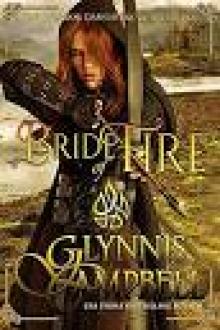 Bride of Fire
Bride of Fire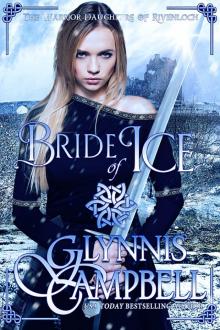 Bride of Ice
Bride of Ice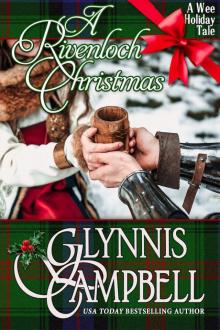 A Rivenloch Christmas
A Rivenloch Christmas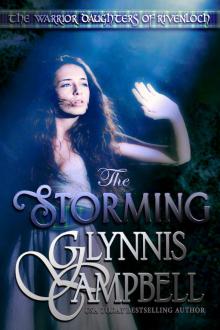 The Storming
The Storming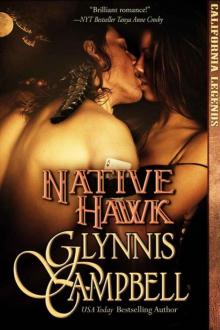 Native Hawk (California Legends Book 3)
Native Hawk (California Legends Book 3)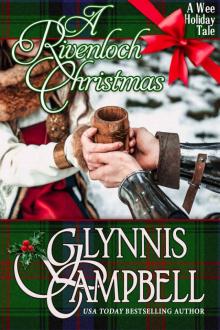 A Rivenloch Christmas: A Wee Holiday Tale (The Warrior Daughters of Rivenloch Book 0)
A Rivenloch Christmas: A Wee Holiday Tale (The Warrior Daughters of Rivenloch Book 0)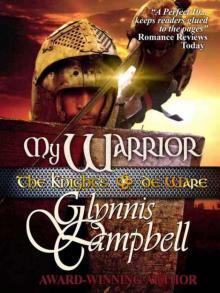 Knights of de Ware 02 - My Warrior
Knights of de Ware 02 - My Warrior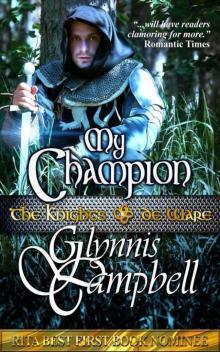 Knights of de Ware 01 - My Champion
Knights of de Ware 01 - My Champion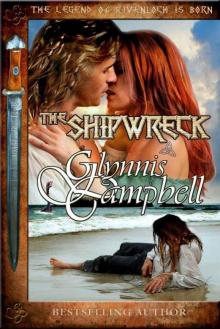 The Shipwreck
The Shipwreck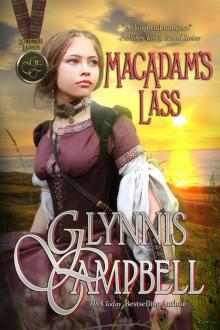 MacAdam's Lass
MacAdam's Lass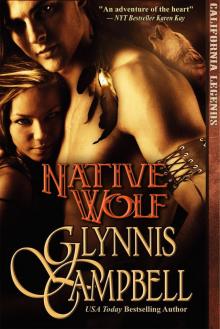 Native Wolf
Native Wolf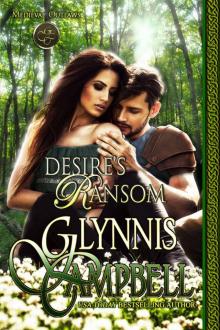 Desire's Ransom
Desire's Ransom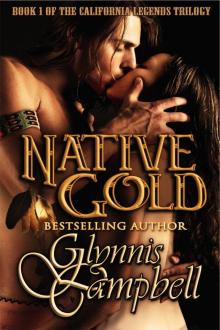 Native Gold
Native Gold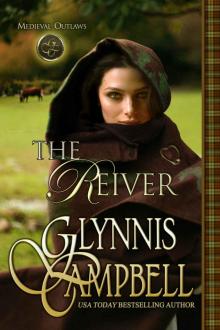 The Reiver
The Reiver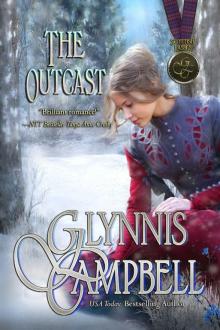 The Outcast
The Outcast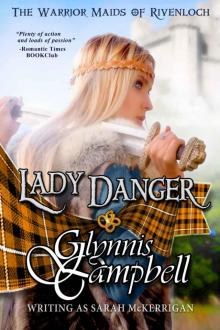 Lady Danger (The Warrior Maids of Rivenloch, Book 1)
Lady Danger (The Warrior Maids of Rivenloch, Book 1)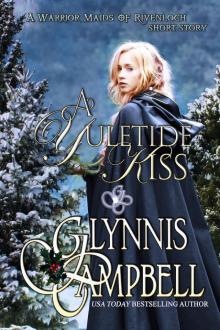 A Yuletide Kiss
A Yuletide Kiss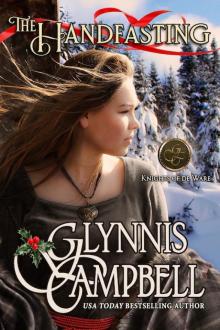 The Handfasting
The Handfasting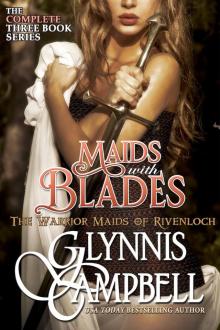 Maids with Blades
Maids with Blades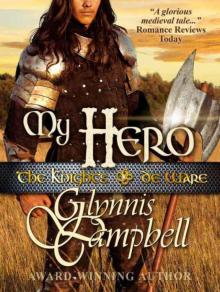 Knights of de Ware 03 - My Hero
Knights of de Ware 03 - My Hero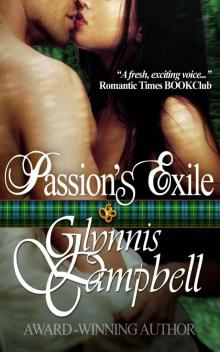 Passion's Exile
Passion's Exile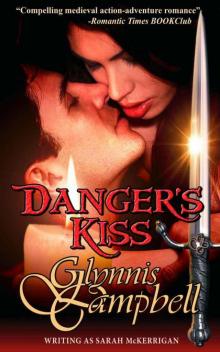 Danger's Kiss
Danger's Kiss Highlanders for the Holidays: 4 Hot Scots
Highlanders for the Holidays: 4 Hot Scots